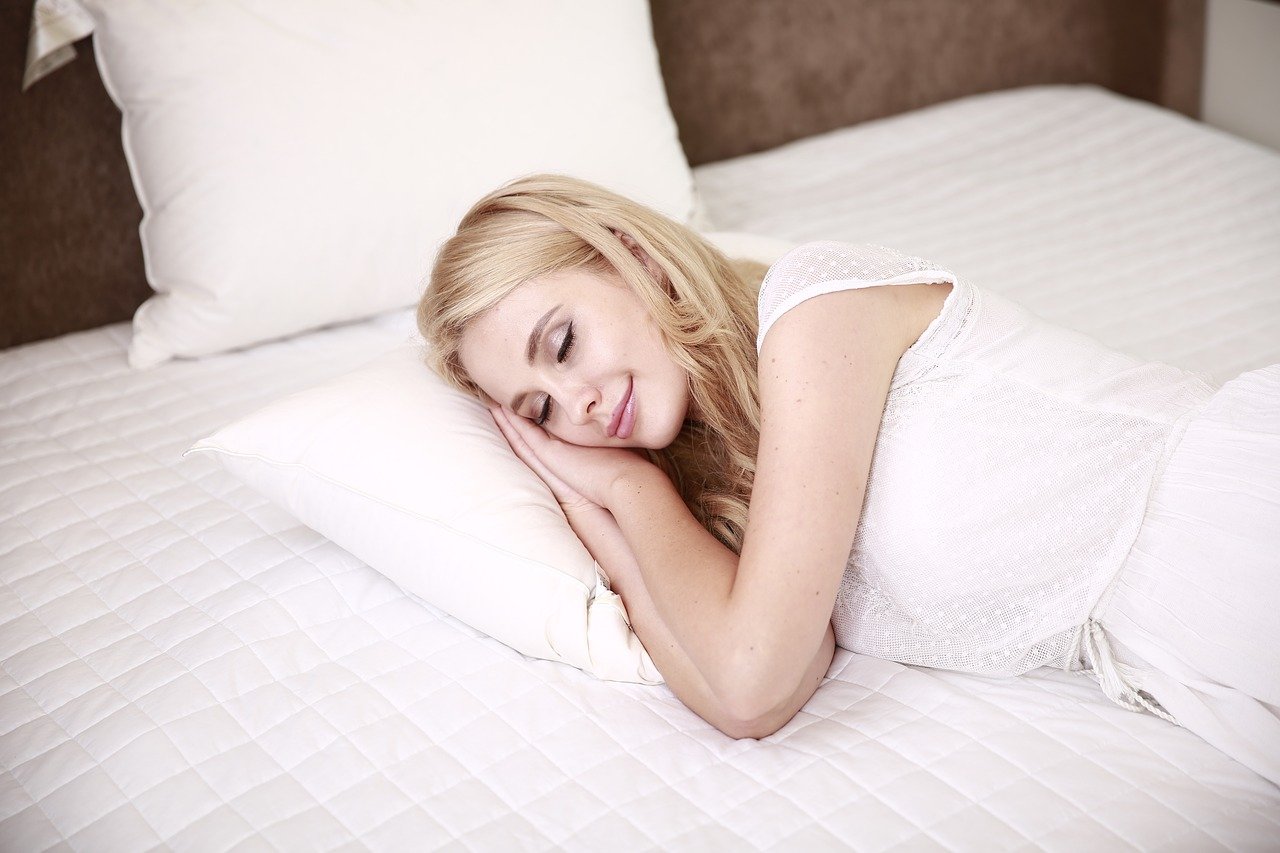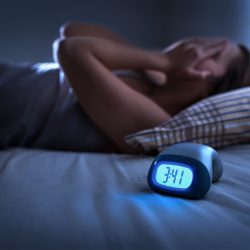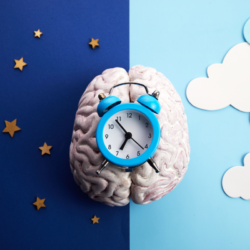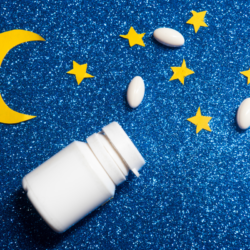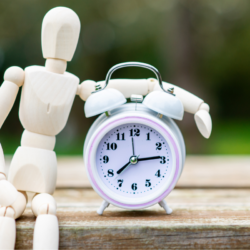Sleep is a natural phenomenon that results in a loss of consciousness and awareness of the outside world. The average French person sleeps an average of 7 hours during the week and 8 hours at the weekend. During nocturnal sleep, there are 3 to 5 cycles of around 90 minutes each. Each cycle is divided into :
- A 4-stage slow-wave sleep phase during which EEG (electroencephalogram) activity becomes slower and slower.
- A REM sleep phase characterised by rapid EEG activity, during which dreams occur and important events of the day are recalled.
Slow-wave sleep accounts for around 75-80% of total sleep time in adults.
Circadian rhythm disorders
This is a dysfunction between the rhythms of waking and sleeping.
Time zone syndrome:
This occurs in the case of rapid travel across more than two time zones. In particular, we found that travelling eastwards (favouring sleep cycles) caused greater symptoms than travelling westwards (delaying sleep cycles). These symptoms will continue during the recovery period, which varies from person to person. Because of the unstable rest, the person will feel tired and irritable.
Shift work disorders :
These disturbances will be proportional to the frequency of schedule changes. Poor sleep quality, noise and light disturb rest periods; insufficient sleep, known as “chronic sleep deprivation”, with the onset of various ailments (irritability, depression, gastro-intestinal problems).
Alteration of the sleep phase:
- Delayed phase syndrome: The subject spontaneously goes to bed later and, having to get up at the same time, will experience sleep deprivation (a very common phenomenon in adolescents).
- Phase advance syndrome: This syndrome is generally found in older people with a tendency to go to bed early. Sleep then decreases and is interspersed with several short episodes of waking.
Restless legs syndrome:
It combines:
- A syndrome of impatience of the lower limbs with sensations of tingling, dripping, burning in the lower limbs during the waking phase.
- Movements of the lower limbs and their extremities during sleep, causing sleep to become disorganised.
It is harder to fall asleep, and insomnia tends to become chronic, leading to fatigue, difficulty concentrating and mood disorders.
Some naturopathic advice to limit circadian rhythm disorders
- Taking a melatonin cure can help minimise the effects of jet lag and problems associated with shift work.
- Good sleep habits can help.
- Exposing the eyes to bright light at appropriate times can be the most useful strategy. These exposures help to resynchronise the internal clock. For example, to minimise jet lag, travellers should spend time in the sun, particularly in the morning, once they arrive at their destination. Shift workers should expose themselves to bright light (sun or artificial light) when they need to be awake. Wearing sunglasses on the way home reduces exposure to bright light before sleep and can help shift workers fall asleep more easily after returning home. While shift workers are asleep, they should make the room as dark and quiet as possible. Sleep masks and white noise devices can be used. Exposure to bright light in the morning can help people with delayed sleep. Bright light in the evening can help people with advanced sleep disorders.
- Another strategy is to gradually shift the sleep-wake schedule towards the desired one. Travellers can benefit from a gradual change in their schedule to that of their destination, starting well before the time of travel.
What plants should I use for circadian rhythm disorders?
Medicinal plants have been used for thousands of years to treat a variety of ailments, including circadian rhythm disorders, also known as biological clock disorders. They can cause fatigue,insomnia, depression and other mental and physical health problems.
There are several medicinal plants that can help regulate circadian rhythms and improve sleep quality. One of the plants most commonly used to treat sleep disorders is valerian. Valerian contains compounds that have a calming and relaxing effect on the nervous system, which can help improve sleep quality. Chamomile, passionflower and linden are also plants often used to treat sleep disorders.
Melatonin is a hormone produced by the pineal gland that plays an important role in regulating circadian rhythms. There are plants that can help increase melatonin levels in the body, such as saffron, which is known to increase melatonin levels.
Ashwagandha is an adaptogen that can help reduce stress and anxiety, which are often contributing factors to circadian rhythm disorders. Ashwagandha can also help regulate levels of stress hormones, such as cortisol, which can affect circadian rhythms.
Finally, it is important to note that medicinal plants should not be used as a substitute for medical treatment prescribed by a doctor. It is important to consult a health professional before taking herbal remedies to treat circadian rhythm disorders. It is important to note that everyone is different and that certain plants may cause side effects or may not be appropriate for certain people. It is therefore important to consult a healthcare professional for personalised advice.
Valerian EPS: Valerian is a 5-HT5a receptor agonist and plays a role in serotonergic regulation of the circadian cycle by increasing levels of 5-hydroxytryptamine(serotonin).
How can insomnia be treated naturally?
Insomnia is the absence or insufficiency of sleep, which prevents proper repair. This is interspersed with early awakenings.
Insomnia on falling asleep is the most common form of this disorder. This form of insomnia can also occur in the second half of the night, after 3 a.m.: the subject wakes up anxious or dominated by obsessive thoughts, then ends the night with a poor quality sleep. It can cause daytime headaches, irritability and drowsiness.
The nocturnal cogitation that causes insomnia is often due to a collapse of GABA.
The main causes :
- Hyperstimulation of the arousal system : noise, anxiety, psychological trauma, intellectual or physical hyperactivity.
- Psychological factors: stress, anxiety, depression, neurosis.
- Physiological: heavy meals, too much caffeine.
- Pathological: sleep apnoea, asthma, restless legs syndrome, enuresis, chronic alcoholism.
There are two types of insomnia:
- Acute insomnia, which lasts from 1 to 3 weeks.
- Chronic insomnia, which occurs at least 3 nights a week for at least 1 month.
Probiotics for better sleep?
Certain bacteria and micro-organisms in the microbiota help regulate serotonin, which is necessary for maintaining a healthy circadian cycle
A research team from theUniversity of Tsukuba (Japan) has shown how the intestinal microbiota affects sleep-wake architecture by altering the intestinal balance of neurotransmitters. For 4 weeks, the researchers treated male mice with broad-spectrum antibiotics to deplete their intestinal microbiota.
When they compared them with a control group of untreated mice, they found over 200 differences: around 60 normal metabolites were missing from the antibiotic-treated mice, and some varied in quantity (sometimes more, sometimes less). They discovered that the biological pathways most affected by the antibiotic treatment were those involved in the production of neurotransmitters. For example, the tryptophan-serotonin pathway was virtually blocked in mice with depleted microbiota. This suggests that in the absence of certain intestinal micro-organisms, the mice were unable to produce serotonin from the tryptophan they ingested. Similarly, these mice were deficient in vitamin B6 metabolites, which accelerate the production of serotonin and dopamine. In addition, electroencephalograms were performed on the mice to observe their brain activity during sleep. The rodents treated with antibiotics had more disturbed REM sleep than the control mice, and alternated sleep and wake phases more frequently than their counterparts.
What if our foods, such as legumes, butter, dairy products and chocolate, offered alternatives to sleeping pills?
Tryptophan is an amino acid, a precursor of serotonin, found in legumes, soya, brown rice, fish, peanuts, pumpkin seeds, milk, cheese (Parmesan), poultry, eggs, brewer’s yeast, parsley, chocolate, bananas, dried fruit, etc
Another molecule could play an important role: Butyrate, a fatty acid produced by our bacteria from dairy products and the fibre present in many plants.
In May 2019, a research team from the University of Washington administered tributyrin, a pro-drug of butyrate, to a group of rodents by oral gavage. They observed an increase in the duration of their deep sleep of almost 50%, but also a drop in their body temperature and a reduction in REM sleep episodes (the moment when we dream). In contrast, systemic subcutaneous or intraperitoneal injection of butyrate had no significant effect on sleep or body temperature. These results suggest that the effects of butyrate on sleep are mediated by a sensory mechanism located in the liver and/or in the wall of the portal vein. Hepatoportal butyrate-sensitive mechanisms could play a role in the modulation of sleep by gut microbiota.
Naturopathic advice to limit insomnia attacks
- Prefer light meals in the evening.
- Avoid consuming caffeine, sympathomimetics or other stimulating drugs (generally around bedtime, but even in the afternoon for people who are particularly sensitive).
- Relax before going to bed.
- Avoid exercise or excitement (e.g. exciting television programmes) late in the evening.
- Avoid compensating for sleep debt by sleeping late or taking naps, as this fragments sleep at night.
- People suffering from insomnia should adopt a regular waking time and avoid naps, regardless of the amount of sleep they get at night.
Which plants should be used for insomnia attacks?
- True lavender essential oil: Lavender essential oil induces sleep by inhalation.
- Passionflower EPS: A sedative, passionflower is indicated for insomnia and sleep disorders caused by vesperal excitation.
- Eschscholtzia EPS: Eschscholtzia is a hypnotic and a sleep inducer, reducing the time it takes to fall asleep and extending the duration of sleep by inhibiting the enzymatic breakdown of catecholamines.
- This plant is used to treat insomnia, especially insomnia caused by difficulty falling asleep and anxiety. The time taken to fall asleep is significantly reduced.
- Lemon balm EPS: Lemon balm leaves have a sedative and tranquillising effect comparable to that of benzodiazepines. Melissa officinalis thus promotes sleep in cases of insomnia due to falling asleep, as well as in benzodiazepine withdrawal. This plant is generally indicated for nervousness, insomnia and anxiety.
Which homeopathic strains should be used for sleep disorders?
- Gelsemium 15CH: In case of bad news, anticipatory nervousness with inhibition and aggravation of symptoms by fear of not falling asleep. Take 5 granules before the evening meal and at bedtime, and repeat if you wake up at night.
- Ignatia amara 15CH: In the event of a succession of emotions, grief, with paradoxical behaviour, hypersensitivity, spasms: lump in the throat, sobbing, knot in the stomach. Take 5 granules before the evening meal and at bedtime, and repeat if you wake up at night.
- Coffea cruda 15CH: In cases of hyperideation, following strong emotions. Take 5 granules before the evening meal and at bedtime, and repeat if you wake up at night.
- Aconitum napellus 15CH: In case of nocturnal awakening between midnight and 1 a.m. with anxiety, sensation of imminent death, intensity, brutality. Take 5 granules before the evening meal and at bedtime. Repeat if you wake up at night.
- Nux vomica 15CH: In the event of difficulty in falling asleep, then waking up around 3 a.m. with preoccupation, sensitivity to noise, overwork. Take 5 granules before the evening meal and at bedtime, and repeat if you wake up at night.
Did you know?
A course of Magnesium has a relaxing effect on the nervous system, helping to induce sleep. In addition to various psychological processes, magnesium also plays an important role in the production of melatonin :
- Inorganic salts: These are generally salts that are poorly assimilated by the body. In high doses, they can also speed up transit and even cause diarrhoea(magnesium chloride, magnesium hydroxide, etc.).
- Organic salts: These salts are better assimilated and better tolerated by the body (magnesium citrate, magnesium malate, etc.).
- Amino-complex salts: These are the most recent generation of salts, combining a protein hydrolysate (rice, for example) with magnesium to guarantee better assimilation and tolerance.
Magnesium is mainly absorbed in the intestine. It enters the enterocyte (intestinal cell) via specific channels that are easily saturated. Aminocomplex salts, on the other hand, use the amino acid absorption pathway, which is active and in the majority, and therefore more effective.
As a supplement, vitamin B6 helps magnesium enter the cell. Taurine, for its part, keeps it in the cell: we speak of the “magneto-fixing” power of vitamin B6 and taurine. 98% of the body’s magnesium is found in the cells, which is why it is so important to fix it there.
The presence of vitamin B6 and taurine in the nutritional composition of the food supplement is therefore essential.
Insomnia and melatonin
Studies have shown that melatonin can help treat insomnia. Melatonin supplementation can mimic the effect of darkness, encouraging the body to prepare for sleep. It can help to reset the body’s biological clock, particularly in people whose circadian rhythm is out of sync, as is the case with jet lag or night shift workers.
We won’t go into other sleep disorders (idiopathic hypersomnias, narcolepsy, parasomnias, night terrors, sleepwalking, etc.), which require specialist medical treatment.

